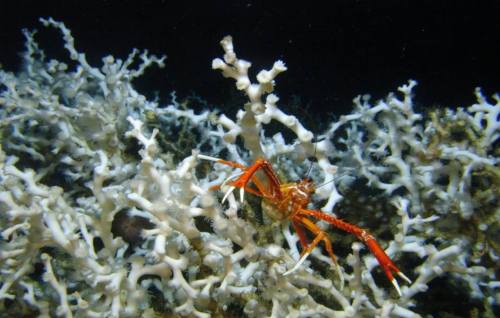Reductions in Cold Water Coral Ecosystems and Ocean Circulation Earth Science is certainly an interd
Reductions in Cold Water Coral Ecosystems and Ocean CirculationEarth Science is certainly an interdisciplinary science. Here is a story of how understanding the past environmental conditions of cold water corals off the coast of Scotland can help us understand patterns in ocean circulation and climate. This piece of study revolves around marine ecology, and how it is associated with physical oceanography, atmospheric sciences and also uses geological dating techniques and geophysical surveys to gain a complete understanding of the science.When you come across the word coral, you expect colourful creatures that thrive in clear, warm, shallow waters. Well, there are however several species of corals that lack the symbiotic algae (zooxanthellae) that provide vibrant colours from photosynthesis, and are found in cold waters (4 degrees Celsius) at depths between 50 and 2,000 meters underwater. The cold water corals - just like their warm water cousins – are havens for biodiversity as these reefs create a safe shelter for invertebrates and fish.However, these ecosystems are difficult to study due to their too deep and cold for scuba divers and hence, monitoring environmental changes in these corals are hard to detect. In order to understand how these reefs have changed over time, scientists need to turn their attention to sedimentary records. With advances in technology and exploratory mapping of the continental shelves by the hydrocarbon industry, our ability to map and characterize such sedimentary records has improved over the years.Recently, as study was conducted at the Mingulay Reef Complex off the coast of west Scotland to understand how the corals have weathered changes in the environment in the past 4500 years. They examined archived coral core samples from the reef complex and also sea floor sediments. Dating techniques such as uranium dating to determine the age of the coral samples and also carbon dating to calculate the relative age of the corals and the water they grew in were used. Furthermore, information on ocean circulation can be inferred from the age of water mass surrounding the corals.The sedimentary record of these cold water corals shows sudden changes in the sea surface circulation that let to abrupt collapses of these ecosystems. From 100 to 1,200 years ago, perturbations in the Atlantic Meridional Overturning Circulation (AMOC) led to a decline in these ecosystems. The AMOC brings warm, salty surface-water from tropics to the north and carries back cold, deep-water south towards the tropics. Absence of cold water corals in the sedimentary record indicate a change in the ocean circulation during which the cold water reefs died or moved elsewhere. This shows that cold-water reef ecosystems are sensitive to changes in the climate and ocean circulation. This study provides insights into how these reef ecosystems could react to future changes in the climate and ocean circulation.NateImage Credits:Cold water coral (Lophelia) - NOAA http://bit.ly/1QbMCWlSingle squat lobster on coral - USGSSources:http://bit.ly/1XnwX5Khttp://bit.ly/20Zbrqdhttp://bit.ly/1TcBLKO -- source link
Tumblr Blog : the-earth-story.com
#science#coral#ocean#chemistry#atlantic#scotland#climate change

